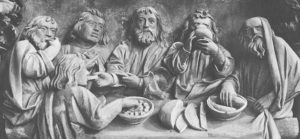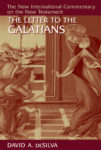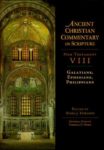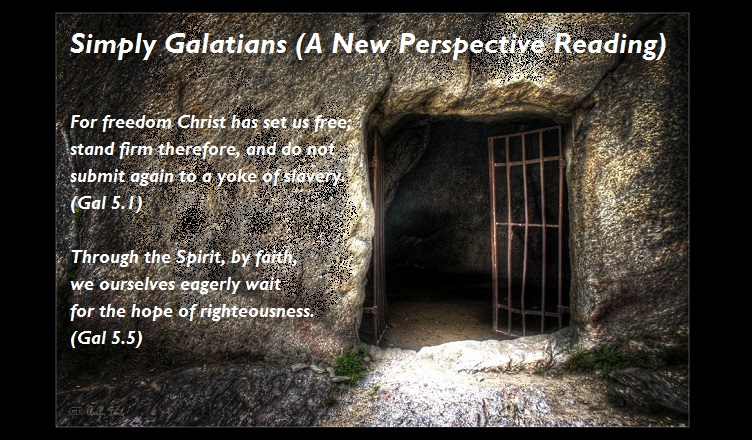From Galatians 2

How can others see by what you do and say that you are right with God?
The Early Perspective on Paul has equipped us to better understand what Paul meant when he says ‘a person is justified by faith apart from works of law’.
In the previous post we were reminded what Paul and Peters gospel is. In this post we consider the implications for this gospel on whether or not Gentile believers need to observe God’s commands in the law of Moses.
We look at Paul’s confrontation with Peter over table fellowship between Jews and Gentiles. In the era of Christ, what is the chief means of identifying God’s people ‘the righteous’. Is it observance of the ‘works of the law of Moses’ or faith in Jesus Christ?
This post is part of my Simply Galatians series.
Passage and Comments
As a reminder of the context, as mentioned in my Introduction, Paul has heard the Gentile Christians were again observing various festivals and sabbaths commanded in the law of Moses and were considering circumcision.
This behaviour leads Paul to question if they have now gone after another gospel. I mentioned in the previous post there are two themes I wish to discuss in Gal 2.1-10.
The first (in the previous post) concerns Paul and Peters common understanding of the gospel.

Paul and Peter both believed the gospel is the story of Jesus (life, death, resurrection, appearances and coming judgment) which declares him Lord and Christ. Their gospel is in accordance with the Old Testament promises and prophecies that anticipate Christ’s coming.
This second (in this post) considers the implications of this Gospel for Gentile believers.

The chief implication relevant to Galatians is that Jesus in the gospel has introduced a new covenant for the people of God. The law of Moses was given to the Jews and part of the old covenant era. Jesus has inaugurated the new covenant, and consequently a new way to live as God’s people (Jews and Gentiles).
The righteous now live through the Spirit, by faith and love. This means the righteous are no longer identified by their observance of the works of law, rather by faith in Christ. This includes believing Gentiles as part of the covenant people of God.
So we begin with the overlapping text from the previous post as I address this theme. Paul is describing what happened in Jerusalem.
Gal 2.1-10
2 Then after fourteen years I went up again to Jerusalem with Barnabas, taking Titus along with me. 2 I went up because of a revelation and set before them (though privately before those who seemed influential) the gospel that I proclaim among the Gentiles, in order to make sure I was not running or had not run in vain.
3 But even Titus, who was with me, was not forced to be circumcised, though he was a Greek. 4 Yet because of false brothers secretly brought in—who slipped in to spy out our freedom that we have in Christ Jesus, so that they might bring us into slavery— 5 to them we did not yield in submission even for a moment, so that the truth of the gospel might be preserved for you.
6 And from those who seemed to be influential (what they were makes no difference to me; God shows no partiality)—those, I say, who seemed influential added nothing to me. 7 On the contrary, when they saw that I had been entrusted with the gospel to the uncircumcised, just as Peter had been entrusted with the gospel to the circumcised 8 (for he who worked through Peter for his apostolic ministry to the circumcised worked also through me for mine to the Gentiles),
9 and when James and Cephas and John, who seemed to be pillars, perceived the grace that was given to me, they gave the right hand of fellowship to Barnabas and me, that we should go to the Gentiles and they to the circumcised. 10 Only, they asked us to remember the poor, the very thing I was eager to do. (Gal 2.1-10)
‘False brothers secretly brought in’. Tertullian (c.e. 155-240) gives some helpful comments describing the issue at hand.

“When, again, he mentioned “certain false brethren as having crept in unawares,” who wished to remove the Galatians into another gospel, he himself shows that that adulteration of the gospel was not meant to transfer them to the faith of another god and christ,
but rather to perpetuate the teaching of the law; because he blames them for maintaining circumcision, and observing times, and days, and months, and years, according to those Jewish ceremonies [works of law] which they ought to have known were now abrogated, according to the new dispensation purposed by the Creator Himself, who of old foretold this very thing by His prophets.
Thus He says by Isaiah: Old things have passed away. “Behold, I will do a new thing.” (Isa 43.19) And in another passage: “I will make a new covenant, not according to the covenant that I made with their fathers, when I brought them out of the land of Egypt.” (Jer 31.32) In like manner by Jeremiah: Make to yourselves a new covenant, “circumcise yourselves to the Lord, and take away the foreskins of your heart.” (Jer 4.4)
It is this circumcision, therefore, and this renewal, which the apostle insisted on, when he forbade those ancient ceremonies [works of law] concerning which their very founder announced that they were one day to cease.” (Tertullian, Against Marcion 1.20)
‘Set before them the gospel I proclaim among the Gentiles’. Paul describes the time when he went before the leaders in the Jerusalem church (The majority of commentators believe this is the Acts 15 Jerusalem council) and told them the gospel message he was proclaiming to the Gentiles. He did this more out of courtesy, since his gospel was non-negotiable (Dunn, Galatians). Paul says that these leaders affirmed his gospel and they realised God had been using him in ministry to the Gentiles.
‘Titus was not forced to be circumcised’. The importance of circumcision for the Jews cannot be overstated. For most Jews: only the circumcised were Jews; only the circumcised were members of the covenant; only the circumcised belonged to the people chosen by God to be his own. Clearly implied is an attempt to have Titus circumcised, on the grounds of being obedient to Gods commands (omissional sin otherwise) and he could not be a member of the covenant people without it. (Dunn, Galatians).
These are the main issues driving my New Perspective reading of Galatians:
- obedience/omissional sin (practice of righteousness), and
- evidence of covenant membership (identity of God’s people).
The key inference Paul derives from this gospel check was that Titus a greek was not forced to be circumcised (Gal 2.3,14). Contrast this with Paul in another letter instructing Titus to insist believers in Christ devote themselves to good works (Tit 3.8), where Paul’s attitude is quite different.
It critical at this point to remember what Paul and Peter’s gospel is to understand Paul’s reasoning.
First, if you farm the Gospels for what Jesus actually commands his followers to observe you will note He is silent on whether his followers are required to be circumcised. Where Gentiles did believe in him, Jesus did not command them to be circumcised and come under the law of Moses. It is significant He simply affirmed their faith (Mt 8.5-13; 15.22-28).
Secondly, as already mentioned the gospel had introduced a new era in salvation history and a new covenant. No longer are the people of God required to live under the law of Moses and therefore be circumcised. Now they follow Jesus’ and his apostles instruction.
Paul lets his churches remain as they were called. As we see in his first letter to the Corinthians.
17 Only let each person lead the life that the Lord has assigned to him, and to which God has called him. This is my rule in all the churches.
18 Was anyone at the time of his call already circumcised? Let him not seek to remove the marks of circumcision.
Was anyone at the time of his call uncircumcised? Let him not seek circumcision.
19 For neither circumcision counts for anything nor uncircumcision, but keeping the commandments of God. (1 Cor 7.17-19)
‘Freedom’. In Galatians 2.4 Paul introduces the theme of freedom from slavery which he will repeat through the letter. Typically slaves serve their masters in a specific way which is occasionally called a ‘yoke’. As in the yoke which sits upon the cattles neck and controls the direction they should walk.
Paul associates circumcision and by implication adherence to the law of Moses as a form of slavery. Those who do not have to observe the yoke of circumcision and the law of Moses (Acts 15.10) are free from the law of Moses, but not service to God (Rom 6.22; 7.4-6). Jesus’ yoke, that is his own commands and instructions are much lighter (Mt 11.29-30).
As Eusebius of Caesarea (c.e. 260-340) has explained in his Proof of the Gospel;

I have now proved that the old covenant and the law given by Moses was only applicable to the Jewish race, and only to such of them as lived in their own land. It did not apply to other nations of the world nor to Jews inhabiting foreign soil.
And I have shown that the ideal of the new covenant must be helpful to the life of all nations: the members of its kingdom are to be restricted in no way whatever [Jews and Gentile]. Considerations of country, race or locality, or anything else are not to affect them in any way at all.
The law and life of our Saviour Jesus Christ shows itself to be such, being a renewal of the ancient pre-Mosaic religion, in which Abraham, the friend of God, and his forefathers are shown to have lived. And if you cared to compare the life of Christians and the worship introduced among all nations by Christ with the lives of the men who with Abraham are witnessed to by Scripture as holy and righteous, you would find one and the same ideal (Ch 5, Eusebius, Proof of the Gospel).
‘Remember the poor’. The only obligation Paul was willing to impose upon his Gentile churches was to help the poor and needy. This is a frequent concern of Jesus’ and something he will judge his people by (Mt 25.31-46 post here). Those who share the righteousness of the covenant (the standing with God which the covenant makes possible) must continue to attest and maintain that standing by acts of righteousness (Dunn, Galatians. Cf. Mt 7.15-20; Tit 1.16; Jn 15.10; 1 Jn 3.7).
Gal 2.11-13
Paul now describes what happened afterwards in Antioch. This is the first of several arguments against Gentile observance of the law of Moses.
11 But when Cephas came to Antioch, I opposed him to his face, because he stood condemned.
12 For before certain men came from James, he was eating with the Gentiles;
but when they came he drew back and separated himself, fearing the circumcision party.
13 And the rest of the Jews acted hypocritically along with him, so that even Barnabas was led astray by their hypocrisy. (Gal 2.11-13)
‘Antioch’. A large amount of scholarly debate is devoted to working out whether this incident occurred before the Jerusalem council in Acts 15 or after. Whether or not Gal 2.1-10 describes the Jerusalem council or not. We do see a chronological ordering from the Jerusalem visit in Gal 2.1-10 to Antioch in Gal 2.11 and onwards. There is also some speculation who the men from James were.

‘Eating’. We have no way of knowing whether or not Peter and the other Jews were eating kosher foods or not. I assume the Gentiles were not. Vegans and Meat eaters can eat together. Either way, Jews normally considered eating with Gentiles unlawful (Acts 10.28). But Peter some time earlier had a few visions from God that suggested Gentiles could be made clean in the eyes of God (Acts 10.9-16). At that time he shared the gospel with them and they received the Holy Spirit (Acts 10.34-48).
For these reasons when Peter was at Antioch he felt comfortable eating with the Gentile believers. In order to do this he had been relaxing various Jewish observances and accommodating himself to become more like the Gentiles. He did this in order to fellowship with them and because he knew these commands were not obligatory.
Eating at the same table was a big sign of fellowship and acceptance.
‘Separated’, ‘the rest of the Jews’. At some point Peter must have learned members a Christian group of Pharisees called the ‘circumcision group’ found out about what he was doing. Wanting to please the circumcision group, he drew back and separated himself from the Gentile believers. It is likely Peter did not think God required him to be separate, rather he did it to please his Jewish peers. This set off a chain reaction among other Jews who followed his lead. They probably thought they were sinning by omission by neglecting to observe God’s commands. Importantly, the church became divided, Jews and Gentiles.
‘Hypocritically’. Peter reversed his behavior, giving the impression eating with the Gentile believers was wrong. He rebuilt what he tore down. That is, by his behaviour he implied it was wrong for Jews to fellowship with Gentile believers. Which is why the other Jews separated from the Gentile believers.
Importantly for Paul, the Gentile believers now feel that they have to become Jews in order to fellowship with Peter and the other Jews. Something Jesus in the gospel never insisted upon. Jesus was called to the Jews (lost sheep of Israel) in order to fulfill God’s promises and bring in the Gentiles (Rom 15.8-9). When Gentiles approached him in faith he didn’t need to separate from them as Peter did at Antioch.
Whether Paul was there when Peter separated or he later came, the text doesn’t say. But when he realizes what has happened he knows it’s not in step with the gospel.
Gal 2.14-16
14 But when I saw that their conduct was not in step with the truth of the gospel, I said to Cephas before them all,
“If you, though a Jew, live like a Gentile and not like a Jew, how can you force the Gentiles to live like Jews?
15 We ourselves are Jews by birth and not Gentile sinners; 16 yet we know that a person is not justified by works of the law but through faith in Jesus Christ,
so we also have believed in Christ Jesus, in order to be justified by faith in Christ and not by works of the law, because by works of the law no one will be justified. (Gal 2.14-16)
‘Before them all’. Paul opposes Peter to his face because it was a public mistake for him to separate from the Gentile believers and make them think they had to observe the law of Moses. All the Jews who separated from the Gentiles made the mistake as well, but Peter instigated it.
 ‘Truth of the gospel’. For Paul the gospel creates the church which consists of believing Jews and Gentiles. This is the mystery he proclaims (Eph 3.1-6; cf. Rom 16.25; Col 1.25-27; Eph 6.19). The ‘truth of the gospel’ is manifested in the ‘one body’ fashioned by God out of Jew and gentile, slave and free, male and female, all of whom are equally acceptable to God on the basis of Jesus’s death. In Antioch this was being lived out here as Peter, Paul, Barnabas, Jewish Christians, and gentile Christians all shared the common life of the Spirit and had fellowship at table as one people, one body. This is the ‘truth of the gospel’ that had been jeopardized by the Jewish Christians (the “false brothers”) who wanted to see gentile Christians circumcised and adopt Jewish practices. (p195, DeSilva, Galatians)
‘Truth of the gospel’. For Paul the gospel creates the church which consists of believing Jews and Gentiles. This is the mystery he proclaims (Eph 3.1-6; cf. Rom 16.25; Col 1.25-27; Eph 6.19). The ‘truth of the gospel’ is manifested in the ‘one body’ fashioned by God out of Jew and gentile, slave and free, male and female, all of whom are equally acceptable to God on the basis of Jesus’s death. In Antioch this was being lived out here as Peter, Paul, Barnabas, Jewish Christians, and gentile Christians all shared the common life of the Spirit and had fellowship at table as one people, one body. This is the ‘truth of the gospel’ that had been jeopardized by the Jewish Christians (the “false brothers”) who wanted to see gentile Christians circumcised and adopt Jewish practices. (p195, DeSilva, Galatians)
Titus was not forced to be circumcised. Likewise, Paul’s argument is that the Gentiles should not feel as if they have to observe the law of Moses. Every one present needed to learn what was going wrong here.
It’s wrong to force Gentiles to live like Jews.
Its unclear whether the following text is still part of Paul’s confrontation with Peter. Some think so. Either way the Gentiles in Galatia are meant to hear it.
‘Jews by birth’, ‘Gentile sinners’. Paul does not understand what a ‘sinner’ is in terms of sinless perfection (Contra. Schreiner, Galatians, who does not apply the term as the bible does and part of the reason why his whole argument is undermined). See my word study on the common usage. Here Paul makes a distinction between Jews and Gentiles. Before Christ, Jews were considered the people of God – the righteous. From the Jewish point of view, Gentiles were sinners, they did not keep the law (Dunn, Galatians). Paul makes this distinction between Jew and Gentiles only to tear it down. They are all God’s people in Christ.
‘Works of law’. I have discussed this in my page on the New Perspective on Paul and in the introduction (LINK) for this series. These are commands in the law of Moses such as Sabbath and festival observance, sacrifices, offerings and purification laws that require someone to do some sort of work.
The Jews and god fearers observed most of these commands, not to become Jews, rather to maintain their righteous status as members of the (old) covenant. They weren’t about getting in, rather staying in.
Theodoret of Cyrus (c.e. 393–466) like many other early church fathers explains what Paul means by the ‘works of law’.

The necessary commandments of the law were taught even by nature. That is, “You shall not commit adultery, you shall not murder, you shall not steal, you shall not bear false witness against thy neighbor, honor your father and mother, and the rest of this kind.”
But the commandments about the sabbath and circumcision and lepers and menstruation and sacrifice were peculiar to the [Jewish] law, since nature taught nothing about these matters. These are what he now calls “works of the law.”
The transgression of these is sin, yet the mere keeping of them is not the way of maintaining perfect righteousness. For these were symbols of other things. Nonetheless they were appropriate to the Jews in their due time. (Theodoret, Epistle To The Galatians 2.15–16; Edwards, M.J. Ed., 1999. Galatians, Ephesians, Philippians, Downers Grove, Il: Intervarsity Press)
‘Justified’. I’ve written extensively on righteousness in my word study and in my page on The New Perspective on Paul. Paul uses the same verb as James does in his epistle (dikaioutai, Gal 2.16=Gal 3.11=Jas 2.24). Paul has the same meaning.
The context concerns fellowship and possibly observance of the food laws in the Mosaic covenant. But also Peter is condemned publicly, which suggests a judicial setting.
We know Paul’s audience have already become righteous (C1 to C3; see the diagram below) through believing the gospel and the atoning benefits of Jesus’ death on the cross (e.g. Rom 5.1,8-9,19; 1 Cor 6.11).
Paul is speaking on behalf of Gentile believers who are already righteous in God’s sight. Who therefore should be accepted in fellowship by the Jewish believers around them. Fellowship among Jews and Gentiles is the explicit issue here.
As with James’ use of justified this is appropriate for existing believers, such as the Gentile believers in Galatia. Paul is speaking about how a person can tell, prove or show they are righteous. (With Barclay, Paul and the Gift, Wright, What Saint Paul Really Said, Contra. Schreiner, Westerholm, Luther).
If I were to paraphrase Paul, he is effectively saying, ‘A person is not identified as one of the righteous by their circumcision, or observing the Sabbath or festivals, or offering sacrifices at the temple or using water to ritually wash themselves clean, but by their belief that Jesus is the risen Christ’. This therefore includes Gentile believers who do not observe the law of Moses.
For all Jewish and Gentile Christians, faith is the boundary marker for the people of God. It is evidence of the Spirit’s work. It always has been. (Note; Bates’ Salvation by Allegiance Alone gives a reasonable argument for interpreting pistis (faith) as allegiance. See my review here).
Dunn has some helpful things to say about justification and ‘works of law’ in his commentary;

[Justified] is a metaphor drawn from the law court to describe the judge’s responsibility to give a fair verdict and to ‘justify’, that is, acquit the innocent. The one thus ‘justified’ or acquitted was thereby found to be ‘righteous’; to be ‘justified’ was to be formally recognized as ‘righteous’.
In Hebrew thought ‘righteousness’ was a concept of relation. People were ‘righteous’ when they met the claims which others had on them by virtue of their relationship. For Israel that meant pre-eminently the relationship with Yahweh, that is the covenant he had made with Israel when he chose Israel to be his people: to be righteous was to live within the covenant and within the terms it laid down (the law of Moses); to be acquitted, recognized as righteous (e.g. Ps 1.1-6; Lk 1.5-6), was to be counted as one of God’s own people who had proved faithful to the covenant.
The phrase itself (‘works of the law’) means most naturally ‘deeds or actions which the law requires’. In typical Jewish understanding the law had been given as part of God’s covenant (Dt 5.1-3), to show covenant members how to live within the covenant and to enable them to do so. So most Jews would, again most naturally, understand the phrase to mean ‘the obligations laid upon Israelites by virtue of their membership of Israel’.
‘Works of the law’ was probably used initially in a polemical context, to denote particularly those obligations of the law which were reckoned especially crucial in the maintenance of covenant righteousness, in the maintenance of an individual Jew’s status within the covenant. ‘Works of the law’ would mean in principle all that the faithful Israelite had to do as a member of the chosen people, that is, as distinct from ‘Gentile sinners’. (Dunn, Galatians)
Paul’s argument against Gentile observance of the works of law is echoed by Justin Martyr (c.e. 103-165) in his dialogue with Trypho the Jew.

“God demanded by other leaders, and by the giving of the law after the lapse of so many generations, that those who lived between the times of Abraham and of Moses be JUSTIFIED by circumcision, and that those who lived after Moses be JUSTIFIED by circumcision and the other ordinances – to wit, the Sabbath, and sacrifices, and libations, and offerings;… For you [Jews] are not distinguished in any other way than by the fleshly circumcision, as I remarked previously.
For Abraham was declared by God to be RIGHTEOUS, not on account of circumcision, but on account of faith. For before he was circumcised the following statement was made regarding him:
‘Abraham believed God, and it was accounted unto him for RIGHTEOUSNESS.’ [Gen 15.6]
And we [Gentile Christians], therefore, in the uncircumcision of our flesh, believing God through Christ, and having that circumcision which is of advantage to us who have acquired it – namely, that of the heart – we hope to appear RIGHTEOUS before and well-pleasing to God:” (Justin Martyr. (1885). Dialogue of Justin with Trypho, a Jew. In A. Roberts, J. Donaldson & A. C. Coxe (Eds.), The Ante-Nicene Fathers, Volume I: The Apostolic Fathers with Justin Martyr and Irenaeus (A. Roberts, J. Donaldson & A. C. Coxe, Ed.) Buffalo, NY: Christian Literature Company, 245)
From a well known recent book on Grace, Barclay reflects the same understanding of justify as well.

[Footnote 73] We should therefore resist the suggestion that the verb δικαιοῦσθαι takes on a new meaning in Paul, becoming a transfer term for “getting into the body of the saved” Westerholm rightly notes that the application of this term in Paul is extraordinary (Perspectives Old and New, pp. 273-84) but this is not because its meaning shifts, but because people are regarded as “righteous” on the basis of an extraordinary, incongruous gift. The verb does not change in meaning from “consider righteous” to “make righteous”; it applies to people who have been changed.
Faith is the evidence that one’s life is incorporated into the saving, transformative dynamic of the Christ-event,
which is nothing less than the death of the self (2:19) and the emergence of a new life more properly described as “Christ in me” (2:20). “Torah-practice” and “faith in Christ” are in one sense parallel: they are both evidenced in human lives and could be taken as grounds for being considered “righteous.” (p377, Barclay, Paul and the Gift)
‘By works of the law no one will be justified’. The saying echoes Ps 143.2 which says no one living is righteous before the Lord. Paul narrows its application however. Paul says, ‘by works of law no one will be justified’. Meaning, observance of circumcision, the Sabbath and festival, Levitical sacrifices, offerings and purification laws will never identify a person as righteous in God’s sight. This is a fairly big statement considering these were commands of God given in the law of Moses.
Gal 2.17-18
17 But if, in our endeavor to be justified in Christ, we too were found to be sinners, is Christ then a servant of sin? Certainly not! 18 For if I rebuild what I tore down, I prove myself to be a transgressor. (Gal 2.17-18)
‘Found to be sinners’. Have Paul and Peter really done the right thing by ignoring the law? If people do not do what they are commanded to do they sin by omission. Worse, they have been leading others to do the same. If they were found to be sinners then it shows the new way of life Jesus opened up was wrong all along and Jesus himself a servant of sin. The idea is abhorrent to Paul. Certainly not!
There is no going back for Paul. If he goes back and gives himself over to Judaism and instructs others to do the same then he shows that he was wrong in the first place to stop observing the law of Moses and instead believe in Jesus and follow him.
‘Rebuilt what he tore down’. This is the mistake Peter inadvertently made. At one point he was in fellowship with the Gentile believers, but then he turned away. His change of behaviour was perceived by others to mean what he was previously doing was wrong. i.e. ‘He rebuilt what he tore down’.
Gal 2.19-21
19 For through the law I died to the law, so that I might live to God. 20 I have been crucified with Christ. It is no longer I who live, but Christ who lives in me. And the life I now live in the flesh I live by faith in the Son of God, who loved me and gave himself for me. 21 I do not nullify the grace of God, for if righteousness were through the law, then Christ died for no purpose.” (Gal 2.19-21)
‘I died to the law’. Paul, the Jew with immaculate credentials moves into his own experience regarding his thoughts on the law of Moses. The law is dead to him. He is no longer obligated to obey it. He now lives and he lives by faith in Jesus (cf. Rom 7.4-6).

Paul shares a little of his underlying feelings about what Jesus’ death means for him. He made a personal decision to turn away from the law. He did it because of the immense love his Lord Jesus Christ showed him in giving up his life for him.
What happens to the Christ happens to his people (2 Cor 5.14).
- When Christ was crucified so was Paul.
- When Christ was buried so was Paul.
- When Christ was raised to new life so was Paul.
‘Righteousness’. Paul has in mind the state God’s people are in as they serve God (Rom 6.13-19). (Contra. Schreiner, Galatians, who denies the ethical outworking of Christ’s death. E.g. 1 Cor 6.19-20) Paul rhetorically asks the what the value of Christ’s death would be if righteousness could come by the law of Moses. He highlights that Jesus’ death is the only way people can become righteous (C1 to C3; cf. Rom 5.19) and enter this state. The law of Moses could not defeat the power of sin, Jesus Christ, God’s sin offering does (Rom 8.3-4).
Words for Believers

Has anyone ever said you have to be circumcised or observe the feast of tabernacles?
Most Christians today are Gentile believers. We have never really had Jews using the Old Testament scriptures to get us to observe various works of law. The early Gentile believers did.
Paul has done his work in getting us to recognise the people of God are those who believe Jesus is the Christ. That is what we confess as Christians.
Have you ever seen someone refusing to eat meat or some other food?
If we were to see people eating kosher foods, observing the Jewish passover, the festivals of unleavened bread and booths or even offering an animal sacrifice we probably wouldn’t launch into this kind of argument as Paul did. I wonder if we as Gentiles would understand what was going on in the first place.
Have you ever seen someone doing a good deed? How did you respond?
If we saw someone doing good works we probably wouldn’t use this kind of criticism on them either.
Some Protestants in my experience have attacked those who encourage others to do good works or teach they are important. This is contrary to Paul’s practice (Gal 6.7-10; Tit 3.8,14; 2 Cor 5.9-10). We shouldn’t let wrong interpretations of justification by faith apart from works of law (e.g. Luther, Schreiner) deter us from doing what is right (Jas 4.17).
Abiding in God’s love by keeping his commands is indispensable to our Christian walk (Jn 15.10). Likewise the practice of righteousness is what distinguishes God’s children from the children of the devil (1 Jn 3.7).
From this I argue believers in addition to their faith are justified by their words (Mt 12.36-37) and their good works (Jas 2.21-24). i.e. Believers are recognised as righteous before God (Lk 1.5-6; Gen 7.1) by what they do and say, but not by the commands given to Israel in the law of Moses.
Can others see by what you do and say that you are right with God?
The passage helpfully points us towards the immense value of Christ’s death for us and our involvement in it. Righteousness is through the death of God’s son. Praise Jesus.
Click here to go to the next post in the series.
Copyright © Joshua Washington and thescripturesays, 2017. All Rights Reserved.





